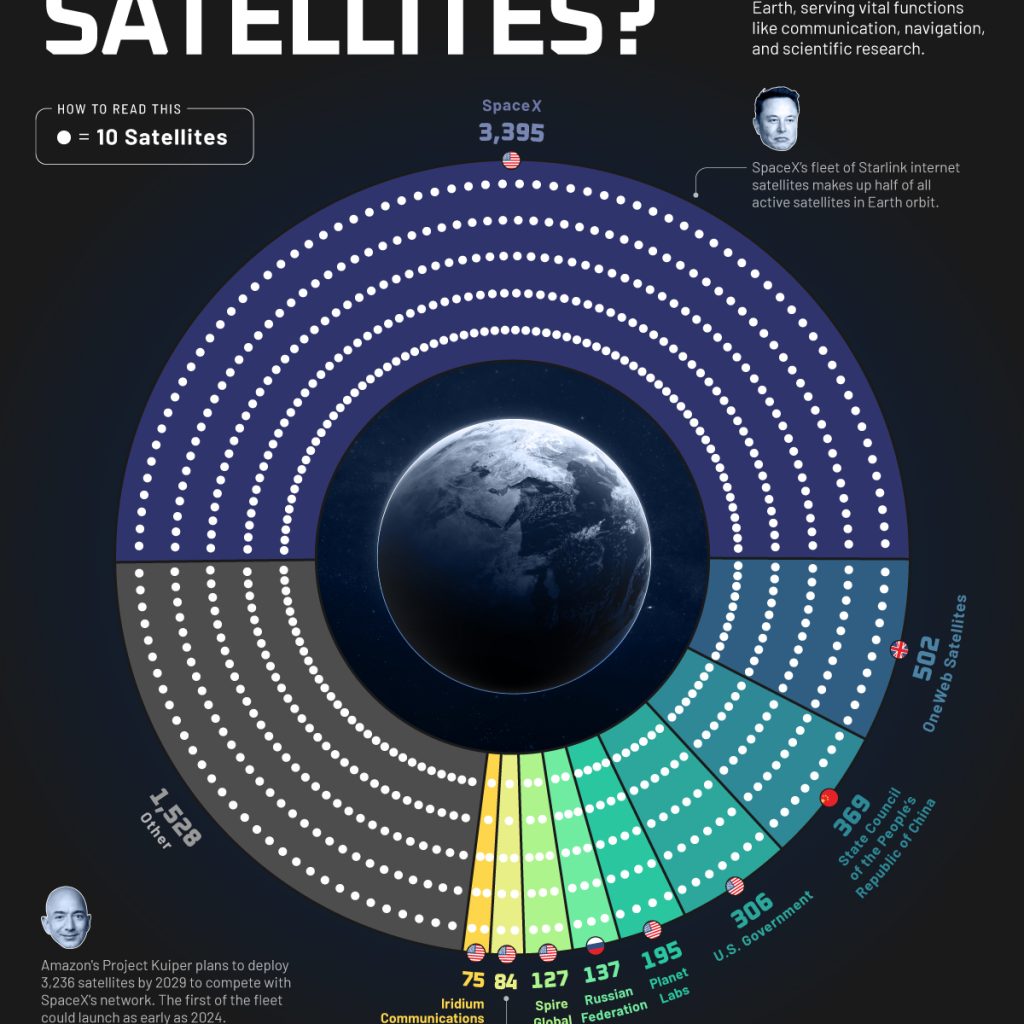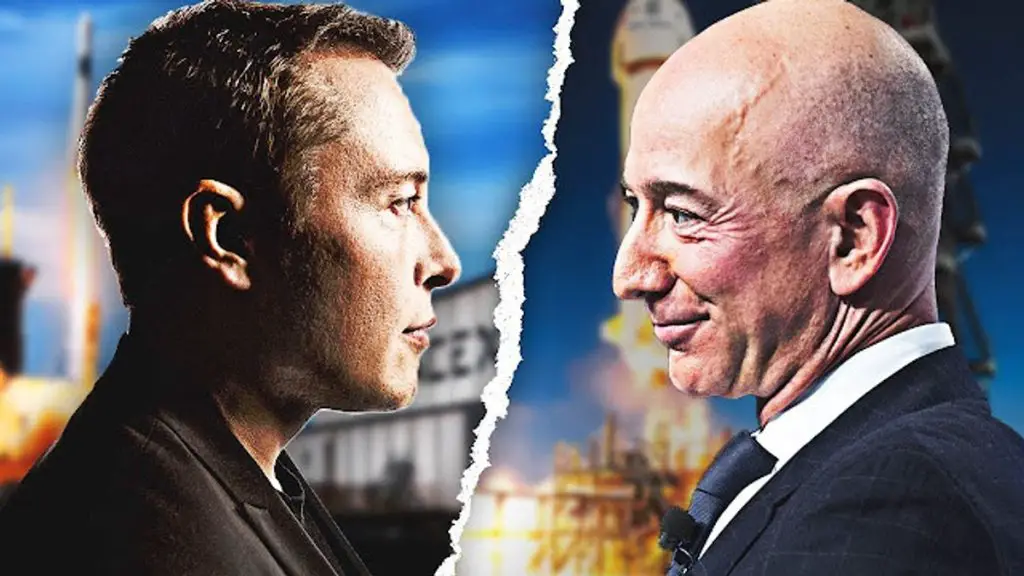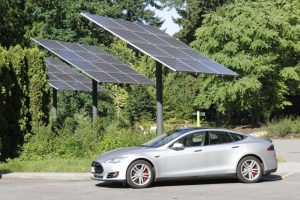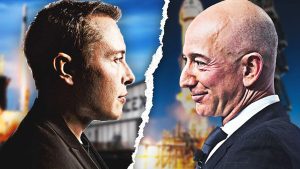Elon Musk and Jeff Bezos are bringing affordable broadband connections to everyone via their satellites. Their ambitions require thousands of satellites orbiting the Earth, worrying many experts.
Does the benefit of their Starlink and Project Kuiper service outweigh the problem of an overcrowded earth orbit? Continue reading the article to know who will win this space war between Earth’s ambitious billionaires.

Contents
Elon Musk vs Jeff Bezos Space Dominance
The sky is no longer the limit regarding global internet access. In the age of space broadband, tech giants Elon Musk and Jeff Bezos are battling to control wireless internet service. Satellite broadband is allowing more people to reach the internet. It removes the need for cables, posts, and other infrastructures that need money and permits.
We have around 7,000 satellites circling the Earth as of 2022. Many of this comes from one of the key players, and more are coming. SpaceX has already launched thousands of Starlink satellites, making up about 50% of the total satellites in orbit.
The science community is concerned that this competition for space internet access is crowding our orbit. Concerns over night sky visibility and regulatory disputes have followed the surge in Starlink’s satellite launches. However, people want to sign up for the service. Chances are high there will be more Starlink satellites.
Meanwhile, Jeff Bezos’ Project Kuiper is quietly gearing up to be a formidable rival. Though the first fleet could launch as early as 2024, Amazon’s plan to deploy 3,236 satellites by 2029 aims directly at SpaceX’s market share. The project is still shrouded in secrecy, but its ambitions are sky-high than Musk’s Starlink.
Second place in satellite numbers goes to the lesser-known British OneWeb Satellites, holding 7% of the market share. Interestingly, OneWeb often relies on SpaceX to launch its satellites, underlining SpaceX’s overarching influence in the industry.
Governments also own a large portion of these orbiting tools. While the U.S. remains a leader, China’s space program has rapidly accelerated, adding more satellites for Earth observation and defense.
Universal internet access is becoming a reality. One out of every three people worldwide has never used the web. Space broadband is bringing the net to these people at an affordable monthly cost.
As Musk and Bezos escalate their battle for broadband dominance, they’re not just competing with each other; they’re racing against time and rising global needs.
So, in this digital age where the connection is king, the question is: whose satellites will rule the sky? Can we accept a crowded earth orbit in exchange for worldwide internet access? Time will tell.
Brief Look at The Key Players
SpaceX Starlink
For a customer, using Elon Musk’s Starlink is straightforward. You get a kit that includes a small dish and a modem. Place the dish outside, plug in the modem, and you’re online. It’s meant to give high-speed internet in places inaccessible by traditional ISPs. On top of that, Starlink has also served in emergencies. It provided crucial internet service to first responders during wildfires on the U.S. West Coast.
Project Kuiper
If Amazon’s Project Kuiper follows its planned route, expect a similar customer experience to Starlink. You’ll receive hardware to install, aiming to offer high-speed internet access. Unlike Starlink, Kuiper plans to tap into Amazon’s existing tech ecosystem. This means integration with Amazon Web Services for cloud storage could expand. It’s not just about connectivity; it could be a full tech suite.
Closing the Digital Divide
Starlink and Project Kuiper aim to bring internet access to the world’s most remote places. Starlink uses its expansive satellite network to reach far-off locations where traditional internet is scarce. Project Kuiper, still in development, has similar goals.
Broadband in closed-off communities can make a difference to its people. Children can learn about nearly any subject under the sun from online classrooms hosted by teachers across the globe. Patients can get a virtual checkup from doctors through online conferences.
Starlink, Project Kuiper, and possibly more satellite ISPs are bringing the net to places that were not possible before. This means more businesses and work opportunities for most countries.

Space Pollution Concerns
Elon Musk’s SpaceX is shooting for the stars with its Starlink project. The goal? Put more than 40,000 small satellites into orbit to create a super-fast internet network worldwide.
Sounds cool, right? But there’s a hitch. NASA is saying, “Hey, wait a minute!” They worry that with all these new satellites, space will become like a crowded highway, making crashes more likely.
NASA even wrote a letter to the Federal Communications Commission about this. They’re not against SpaceX’s big plans. They want to make sure it’s done safely and in a way that won’t mess up the long-term health of space.
They use a term called “conjunction,” meaning objects passing too close in space. NASA now tracks about 25,000 objects in orbit, and adding tens of thousands more from SpaceX would skyrocket.
István Lőrincz, who co-founded Morpheus Space, says there’s a big challenge here. How do you manage traffic in space when different countries have different rules? Plus, space is full of debris from old satellites and other stuff that’s already crashed.
The U.S. government even has a project called Orbital Prime. They’re trying to find ways to clean up all that junk floating around up there.
So what does this mean for Musk and Bezos? Well, it’s a big deal. They’re not just racing each other; they must also consider keeping the space safe and clean for everyone. NASA has even pointed out that existing satellites are messing with telescope images on Earth.
Imagine trying to look at the stars and seeing streaks of light from satellites instead. That’s not what astronomers signed up for.
And it’s not just NASA that’s concerned. Lőrincz says the whole industry needs to work on this problem. If we don’t figure out how to manage space traffic and clean up debris, we will have a cosmic junkyard. And nobody wants that.
SpaceX says their satellites have special systems to avoid crashes, but NASA isn’t convinced. They ask tough questions like, “Can your tech handle a crowded space highway?”

What’s Next in the Bezos vs Musk Space Race
As the two billionaires are connecting the world, both are also working on bringing humanity to the next frontier.
Space Capabilities
So, Elon Musk jumped into the scene with SpaceX in 2002. His big idea? Make space trips as routine as air travel. He nails it with Falcon 1, the first privately made rocket to orbit Earth. But he doesn’t stop there. Next comes Falcon 9, a reliable rocket even NASA started using it. People are paying attention now.
Jeff Bezos came into the picture earlier with Blue Origin in 2000. But he’s the slow and steady guy. He’s not chasing headlines; he’s doing his own thing, focusing on trips to the edge of space. Bezos is playing the long game, carefully investing his Amazon money into rockets that can be reused, just like SpaceX.
Both companies have their fans, both in the public and in high places. They’re grabbing big contracts and making real change in a field once ruled by governments. Now, they’ve become the big shots of the space world, and they’re taking us along for the ride.
The Rivalry Heats Up
Elon Musk and Jeff Bezos are like the rock stars of space, but they’re not singing in harmony. These guys go head-to-head on Twitter and even in the courtroom. Remember the fight over a NASA launch pad? SpaceX won, but it got messy. This rivalry is more than just chatter; it’s pushing both to up their game.
They’re competing for bragging rights and fighting over real contracts. SpaceX once said they were close to going under if they lost a NASA contract to Blue Origin. That’s how intense this is. And when SpaceX wins, Blue Origin isn’t shy about voicing their complaints. But let’s be real: This competition is good for space exploration. It keeps everyone on their toes.
Looking at Mars
Elon Musk is all in when it comes to Mars. He wants a whole colony there! He’s even priced out one-way tickets at about $500,000. That’s bold. He thinks this Mars plan could save humanity one day.
Bezos is also eyeing Mars, but he’s not packing his bags yet. He’s more interested in the journey there, with pit stops like space stations and lunar bases. He’s looking at turning space into our new backyard, with factories and maybe even homes up there.
So, while they have different roadmaps, both Musk and Bezos aim for the same destination: a future where space is the next frontier for all of us. And you better believe they’re going full throttle to get us there.
Conclusion
In the space war between Bezos and Musk, you and everyone else is the winner, no matter which of the two companies come out on top. Their ambitions for humanity may also help us see a team finally reaching Mars and beyond.






